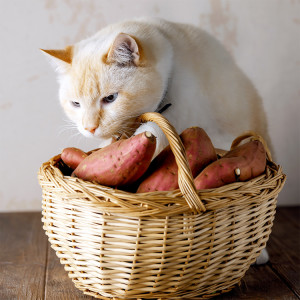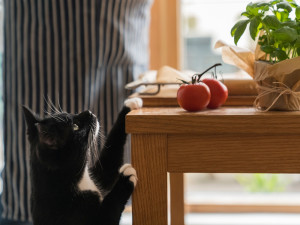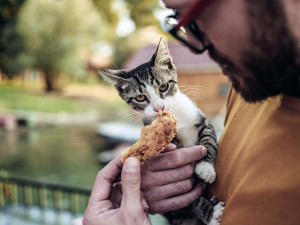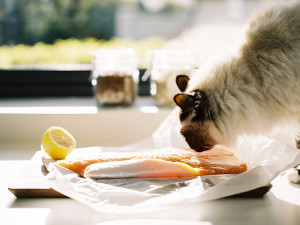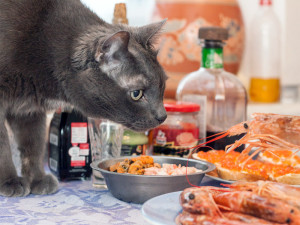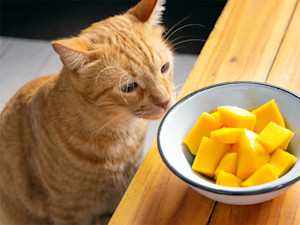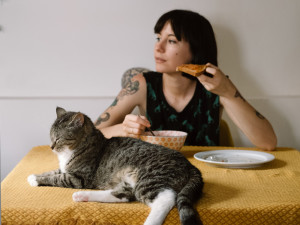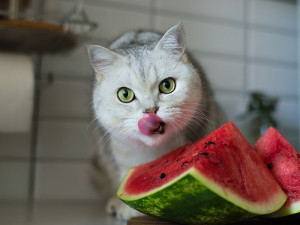Can Cats Eat Peas?
And what you should consider in their everyday diet.

Share Article
You and your cat may be like two peas in a pod when it comes to being roomies, but have you ever wondered if your cat might actually be into eating peas, too? In fact, cats can eat peas in moderation, and they can benefit from some important nutrients in peas, too. However, there are some health concerns to be aware of when it comes to diets that contain large amounts of peas and other legumes. Read on to learn more about cats and peas.
Nutrition facts about peas for cats
Peas are technically the seed that grows inside pods of the Pisum sativum plant. Some varieties of peas have edible pods, while in others, the peas must be removed from the pod before consuming. Sometimes people eat the flowers and shoots of the pea plant as well. Peas are legumes along with all other plants in the Fabacae, or bean family. They are chock full of vitamins, minerals, fiber, and protein.

littleKin™ is Kinship’s home just for puppy and kitten parents. Bop over to check out expert advice, new pet tools, and special deals—all curated for your newest family member.
opens in a new tabAre peas good for cats?
Peas are pretty good for cats; they contain a lot of valuable nutrients that cats can use on the daily. In fact, many cat foods include peas in their ingredients as they can contribute to a balanced cat food diet in important ways. At the same time, it is always important to remember that cats are carnivores, so they really don’t need to eat much plant matter to meet their nutritional needs. If you do have a cat that likes to get down on the occasional snack of peas, they’ll benefit from:
Fiber: Peas are high in fiber, which is an important nutrient for digestive health. It serves to bulk up the stool, prevent constipationopens in a new tab, and provide important nutrients to the gut microbiomeopens in a new tab.
Protein: Protein provides both a source of energy and crucial building blocks for daily biological functions. Proteins contain amino acids which are used to build new proteins in the body including muscles, enzymes, and hormones.
Vitamins and minerals: Peas contain critical vitamins and minerals including B vitamins, magnesium, phosphorus, and iron. These serve many roles in the body such as supporting healthy growth and development, red blood production and the transport of oxygen, brain health, nerve function, and muscle contractions.
Antioxidants: Peas contain unique antioxidant compounds like saponins, flavonols and carotenoids. These compounds may help to reduce inflammation in the body, slow the aging process, protect against certain forms of canceropens in a new tab, and protect cells against damage from free radicals.
Can cats eat any part of the pea plant?
Yes and no. Technically, the pea plant is safe and nontoxic for cats. This includes the stems, leaves, and flowers of the plant along with the pods and peas. However, like all plants, peas plants are very fibrous and difficult to digest. If a cat eats too much plant material, they may be at risk for digestive upset including vomitingopens in a new tab, diarrhea, or gas.
Are peas completely safe for cats?
Peas are safe for cats to eat in small amounts. It is important to prioritize feeding your cat a complete and balanced cat food diet to ensure they are getting all of the nutrients they need in proper proportion. If you are curious about sharing peas with your cat, keep the following points in mind:
High fiber content: While a little fiber can be beneficial for your cat, too much fiber can lead to digestive upset including gas, vomiting, or diarrheaopens in a new tab. This is especially true for cats that are not used to eating lots of high fiber foods. Be sure to start with a very small amount to see how your cat tolerates it.
High starch content: Peas are rich in starchy carbohydrates. While carbohydrates can be used by cats as a source of energy, they do not metabolize carbohydrates as well as omnivores and herbivores. Cats that eat a lot of carbohydrates will be more at risk for weight gain as well as related health problems, including diabetesopens in a new tab.
Other ingredients: Always double check all the ingredients in foods you plan to share with your cat. If you are thinking of sharing a prepared dish that contains lots of other ingredients, you’ll want to make sure there are no other ingredients that could be toxic or unhealthyopens in a new tab for your cat.
Risks with cat foods containing peas: In the last few years, some grain free dietsopens in a new tab and other diets rich in legumes have been associated with heart disease in dogs and cats. This has primarily been a concern in dogs, however, there have also been some case reports in cats. To be safe, it is best to avoid feeding your cat a diet that is too rich in legumes like peas. Steer clear of diets that list legumes as a top ingredient. If it is a minor ingredient it is not a cause for concern.
Other foods that are safe for cats
Shrimp can be a high-protein snackopens in a new tab for cats.
Unsweetened yogurtopens in a new tab can also be OK in moderation.
Low-sugar fruits, like strawberries and other berriesopens in a new tab, can also be shared in small amounts.
Other foods that are dangerous
Hot dogsopens in a new tab and other processed meats are not healthy for cats, and some varieties may even be toxic.
Grapes are also a no-noopens in a new tab, since they contain compounds that may be toxic to cats.
Plants in the Allium family, including garlicopens in a new tab, onions, and chives, are all toxic to cats as well.
The bottom line: Can cats eat human food?
Cats can eat some human foodsopens in a new tab, but unlike dogs and people, cats are obligate carnivores, and they have more unique nutritional requirements that come from animal-based sources. While they can eat the occasional fruit or vegetable so long as they are non-toxic, they really don’t need much plant matter in their daily diet.
Too many table snacks and treats in general may also prevent them from eating enough of their cat food diet and this could lead to nutritional deficiencies over time. The best way to ensure your cat has a healthy diet is to feed them a high quality complete and balanced cat food. This should be where 90 percent of their calories come from, with the other ten percent left over for snacks and treatsopens in a new tab. That way, your cat gets all of the nutrients they really need without overeating.
FAQs (People also ask):
How many peas can a cat eat?
Cats can eat small amounts of peas as an occasional snack, but too many may cause digestive upset.
Is it OK to give cats peas?
Yes, peas are safe for cats in small amounts.
Why do cats like peas?
Cats may enjoy batting them around and chasing them as well as their taste since they are high in protein.
Can cats eat pea shoots?
Yes, pea shoots are also non-toxic for cats, but should only be offered in small amounts to prevent digestive upset.
Are peas good for cats?
Peas are healthy for cats in small amounts.
References:

Dr. Amy Fox, DVM
Amy Fox, DVM is a small animal veterinarian in New York City. A lifelong animal lover, Dr. Fox studied biology in college and then worked as a veterinary nurse before pursuing veterinary school at Cornell University. She has worked in many different settings including shelter medicine, emergency medicine, general practice, and animal cruelty and forensics. She is especially interested in nutrition, preventative medicine and care for senior pets. Dr. Fox also enjoys writing about veterinary medicine and teaching. In her free time she loves to cook, garden, and go for long runs.
Related articles
- opens in a new tab
Can Cats Eat Sweet Potatoes?
Yep—but the plainer, the better. Here’s why.
![Domestic Black Cat Begging for Tomatoes.]() opens in a new tab
opens in a new tabCan Cats Eat Tomatoes?
A little tomato’s safe — with some important caveats.
- opens in a new tab
Can Cats Eat Peanuts?
They’re not technically dangerous, but they’re not ideal.
![Man feeding small white and gray cat a chicken wing.]() opens in a new tab
opens in a new tabCan Cats Eat Raw Chicken?
Careful — cooked chicken is way safer for your kitty.
- opens in a new tab
Can Cats Eat Peaches?
Fat-peach season at the farmers’ market is upon us.
![A Birma Kat Smells Fresh Fish On A Board Ready To Be Cooked.]() opens in a new tab
opens in a new tabCan Cats Eat Tuna?
It’s a classic kitty snack, but don’t go overboard.
- opens in a new tab
Can Cats Eat Shrimp?
They definitely want to...
![Orange cat sniffing cut up mango fruit.]() opens in a new tab
opens in a new tabCan Cats Eat Mango?
It is the perfect healthy treat for you, but what about them?
![A woman eating peanut butter toast with her cat laying on the table]() opens in a new tab
opens in a new tabCan Cats Eat Peanut Butter?
The sweet-and-salty treat is OK in moderation.
![White kitten with tongue out next to slices of watermelon]() opens in a new tab
opens in a new tabCan Cats Eat Watermelon and Watermelon Rind?
Yes, watermelon is a nutritious treat for cats.
